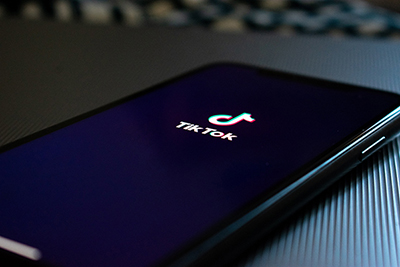TikTok has quickly taken over the internet since its global launch just a few years ago. You have probably heard of this app, which allows users to create short videos. Despite being released globally in August of 2018, it is now one of the most-downloaded apps of the 2010s. But concerns of copyright infringement emanate throughout the platform. A copyright is a collection of rights that belong to someone who creates an original work of authorship, such as a book, song, painting, or sculpture. These rights include the exclusive rights to reproduce, distribute, publicly perform, publicly display, or create derivatives of the creative work. The person or entity to which these rights belong is referred to as the copyright owner. Copyright infringement occurs when a copyrighted work is reproduced, distributed, performed, publicly displayed, or made into a derivative work without the permission of the copyright owner. So, what are some of the copyrighted works that TikTok is infringing? Let’s find out…
TikTok Ignites Copyright Concerns
Commentators and copyright owners have voiced concerns over copyright infringement since TikTok’s launch. Major contentions include the unauthorized use of music (i.e., use without permission from the owner of the song). To better understand the strong reactions, it is important to understand some copyright basics.

Copyright is a form of protection provided to the creators of “original works of authorship” that are fixed in a tangible medium. A work is “fixed” when it is captured in a sufficiently permanent medium such that the work can be perceived, reproduced, or communicated for more than a short time. For example, when an author puts a pen to paper and writes a story that can then be read and made into copies. An original work of authorship is a work that is independently created and possesses at least some minimal degree of creativity. While this is a low bar to meet, it can sometimes be difficult to determine whether a work is minimally creative. Let’s take recipes as an example. A title or a mere listing of ingredients is not adequately creative to derive copyright protection. However, a recipe card or cookbook describing and instructing how to combine various ingredients would likely meet the minimum threshold of creativity required in order to be copyrighted. Additionally, ideas, methods, and systems, cannot be copyrighted. The more creative the work, the stronger its copyright will be. Therefore, highly creative works such as songs and books of fiction are afforded strong copyright protection.
As you can imagine, TikTok is bursting with copyrightable content. TikTok is especially popular for its viral dance videos. These are one of the major copyrightable categories of work showcased on the app. Additionally, the songs in each video are each subject to their own copyright, which may or may not have been used with authorization by the music’s copyright owner. This has created problems for the app…
An Explosive Reaction From the Music Industry
Songs used in TikTok videos have taken over the charts. However, an estimated 50 percent of the music used on the platform is unlicensed (i.e., used without the permission of the copyright owners). This poses a potentially business-crushing problem for the app. Why? Because a copyright owner has the right to exclude others from performing their music. Performance without permission constitutes infringement. Moreover, those found liable for copyright infringement are subject to statutory damages. This means that the monetary range of damages that may be awarded is established by statute. Under the Copyright Act, statutory damages range anywhere for several hundred, to tens of thousands of dollars in cases of copyright infringement. Additionally, statutory damages in copyright cases are awarded per work infringed, and even if the copyright owner suffers no actual damages. This could make TikTok’s potential infringement liability astronomical given the prevalence of unauthorized uses on the platform.
Record labels and music publishing companies initially erupted with concerns over copyright infringement. However, the fiery response has been quelled through ongoing negotiations and procurement of licensing agreements. Notably, in March, TikTok entered into a short-term agreement with Sony, Universal, and Warner. Additionally, anti-infringement efforts showcased in TikTok’s Transparency Report have helped to appease copyright holders.
However, it isn’t entirely clear that these efforts were necessary to protect the app from copyright liability. TikTok would presumably try to defend itself using the fair use doctrine in a copyright battle. However, triumph on fair use ground appears an unlikely outcome.
Is TikTok Protected by the Fair Use Fortress?
Under US law much of TikTok’s copyright infringing activities may be defensible under the fair use doctrine. This doctrine allows for unauthorized use of copyrighted works under certain circumstances. Examples of under US copyright law include commentary, criticism, news reporting, research, and scholarship.
Whether or not a use if deemed fair is determined on a case-by-case basis. This judgment is made by a court based upon four factors. These factors are briefly summarized below:
- The purpose and character of the defendant’s use – This includes whether the use is of a commercial nature or is for nonprofit/educational purposes. A noncommercial use is more likely to be found fair.
- The nature of the copyrighted work – “Highly creative” works (as opposed to highly factual ones) generally have a stronger basis for copyright protection. Whereas works that are deemed less creative or more fact-based have relatively limited copyright protection. In a case where the original work is more creative, a party’s use of the work is less likely to be deemed fair.
- The amount and substantiality of the original work that is taken – In general, the less a party takes from the original work, the more likely it is that their copying will be considered a fair use. However, a party is more likely to run into problems if they take the most memorable aspect of a work.
- The effect of the use upon the plaintiff’s commercial market – This factor essentially looks to whether a party’s use deprives the copyright owner of income. Uses that undermine an existing or potential market for a copyrighted work are less likely to be found fair.
None of these factors are dispositive of a fair use finding. They must instead be considered and balanced against one and another. With that in mind, let’s examine these factors in relation to the use of copyrighted music on the platform.
TikTok, as with many social medium platforms, has become increasingly commercial. The app itself made $17 million in revenue last year. And it recently launched a fund to pay creators directly for their content. Additionally, the songs used would likely be considered highly creative. Therefore, the first two factors would likely not favor a fair use defense for TikTok. Additionally, although it may seem that the short form of the videos means that the amount and substantiality of the works taken favors a finding of fair use, that is not always the case. From my experience, the portion of the songs taken tend to be very important portions, such as the chorus which is what many would consider the “heart” of the song. Therefore, this factor may also weigh against a finding of fair use. And while TikTok has fueled a number of hit songs, this does not automatically mean the app is having a neutral or positive impact on the market for the musical works. At this point, it is unclear whether copyright owners gain any actual increase in revenue for their music. Effects on copyright owners’ compensation will likely also play an important role in determining whether or not this fourth factor favors fair use.
Ultimately, we will only know how a court will decide this type of issue if a copyright owner brings a legal dispute against TikTok. But, when looking at the balance of these factors, it seems that TikTok would not have a strong case for fair use for any unauthorized use of musical works.
TikTok is Unlikely to Win a Copyright Battle
As of right now, TikTok seems to be stifling some copyright concerns through music licensing agreements. However, the threat of legal action for copyright infringement has not been entirely stamped out. And if TikTok ever becomes the subject of a copyright infringement suit for unlicensed uses of musical works, it seems unlikely that the app will succeed with a fair use defense. No matter what happens, this will be an interesting situation to keep an eye on.

Lydia Bayley
Associate Blogger
Loyola University Chicago School of Law, J.D. 2022